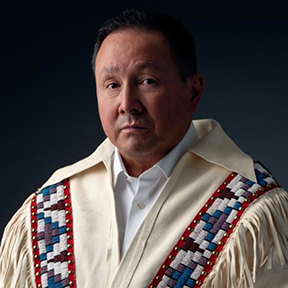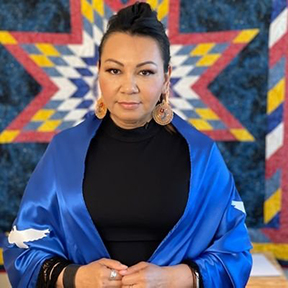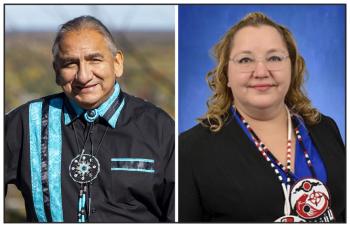Image Caption
Summary
Local Journalism Initiative Reporter
Windspeaker.com
Candidates vying to become the next national chief for the Assembly of First Nations expect it to be a tight race, but will it go to the five ballots it took in 2021?
Voting takes place Dec. 6.
“Team Bellerose is prepared for anything. We're putting in the time. We're putting in a great effort and we believe the lessons learned from last round will be helpful this round as well,” said candidate Reginald Bellerose. He was runner-up to winner RoseAnne Archibald in the 2021 election. Bellerose is a former chief of Muskowekwan First Nation (Saskatchewan).
There were seven candidates in the 2021 AFN election. After the fifth ballot Archibald had garnered 50.5 per cent of the vote, but AFN bylaws require a 60 per cent threshold for a winner to be declared.
Bellerose, Archibald’s lone contender by that point, had dropped from 43 per cent to 35.5 per cent support on the fifth ballot. Bellerose conceded.

Speaking with Windspeaker.com last week, Bellerose said his concession was based on a number of factors, including “a lot of sensitivities” in the country. The 215 unmarked graves of children had just been announced at Kamloops Indian residential school. First Nations communities were suffering from renewed trauma. There appeared to be a push for women leadership at the national level. Because of the coronavirus pandemic the election was held virtually, and chiefs were losing their connectivity as the process went along.
“A group of chiefs, my close colleagues for many, many years, and I spoke. Basically, the thought was let's try our best to not continue to divide the country because…it was getting quite divisive,” said Bellerose.
“We chose not to go to the sixth ballot and I'm comfortable with the decision. It was a well thought-out, well-informed decision. We had Elders there…The way that we chose is very responsible, very professional, I felt, in how we exited the election,” he said. “And it does give me an opportunity to come back now.”
Bellerose’s name is among six candidates that chiefs and proxies will consider when marking their ballots in person in Ottawa or virtually in the hybrid election.
Other candidates are Craig Makinaw, Sheila North, David Pratt, Dean Sayers and Cindy Woodhouse.
Sayers, former chief of the Batchewana First Nation, believes voting will be over quickly.
“I think we'll find right after the first ballot that there's going to be somebody that's probably going to be close to the 60 per cent and we'll have to go to one more ballot and it should be over in the second ballot,” he said.
Sayers contends there’s discussion among candidates as they try to point each other toward supporting other camps after the results of the first round of voting.
“I'm not really involved in any of those discussions. I'm new at this so that's what I understand. There are discussions behind the doors, behind the curtains. Other candidates are trying to convince each other to support various candidates should they not be successful after a particular round,” he said.
Candidates and their camps, he says, will throw their support behind candidates of like mind.
“Historically that's what happens,” said Sayers.
The other candidates aren’t as confident as Sayers that chiefs will make a quick decision.
“I guess the first ballot will kind of tell where things are at and then we'll know,” said Makinaw, former regional chief for Alberta.
Pratt, vice-chief for the Federation of Sovereign Indigenous Nations (Saskatchewan), believes it will take multiple rounds for a decision to be made.
“But I think at the end of the day, the chiefs will come together on who they think will do the best job for the organization and who they believe they'll have the best confidence in to move their mandates and to get the organization back on track,” he said.
“There's lots of strong candidates in this election and I anticipate many rounds,” said Woodhouse, who has taken a leave of absence from her position as Manitoba regional chief to campaign for the national chief’s position.
Woodhouse points out that the 60 per cent threshold required by AFN is stronger than any other election scenario in the country.
“You can put a prime minister in with 30 per cent of the votes of Canadians and they win,” she said.
In the 2021 federal election, the Liberals captured 32.6 per cent of the popular vote and Justin Trudeau began his third consecutive term as prime minister, his second term leading a minority government.
“First Nations, we’re accountable. You know that you do have the support at 60 per cent,” said Woodhouse.
Archibald isn’t the only candidate to become national chief with less than the 60 per cent threshold. In 2009 when Shawn Atleo defeated Perry Bellegarde, Atleo took on the role of national chief with just under that 60 per cent approval rating. He earned 58 per cent on the eighth ballot and Bellegarde conceded.

In 2018, North, former Manitoba Keewatinowi Okimakanak grand chief, was runner-up to Bellegarde, who was seeking his second term. In that election it took only two voting rounds for Bellegarde to get the requisite percentage.
North, who says she’s been told she’s the front runner in this race, says she has “no idea” how many rounds it’s going to take.
“I feel good. I feel confident, but at the same time I'm not taking anything for granted and I will work hard up until election day to get the vote,” she said.
North added that she would also like to see more chiefs voting.
“There's some chiefs that probably don't want to come to assembly. Maybe because of what has happened, or they don't want to be associated with that. I don't blame them,” said Woodhouse, referring to the long battle over Archibald’s term. She was eventually ousted in June following allegations of harassment of staff and breach of the AFN’s whistleblower policy.
But at the same time, Woodhouse said, chiefs' support for AFN is needed.
Election turnout in 2021 was low, part of which could be attributed to the pandemic which forced participation to take place online. Only about 55 per cent of chiefs or proxies (350) voted. AFN represents 634 First Nations.
When Archibald was ousted, only one-third of chiefs or proxies (231) voted virtually, with 71 per cent of those votes supporting her immediate removal from the role.
Windspeaker is owned and operated by the Aboriginal Multi-Media Society of Alberta, an independent, not-for-profit communications organization.
Each year, Windspeaker.com publishes hundreds of free articles focused on Indigenous peoples, their issues and concerns, and the work they are undertaking to build a better future.
If you support objective, mature and balanced coverage of news relevant to Indigenous peoples, please consider supporting our work. Whatever the amount, it helps keep us going.

